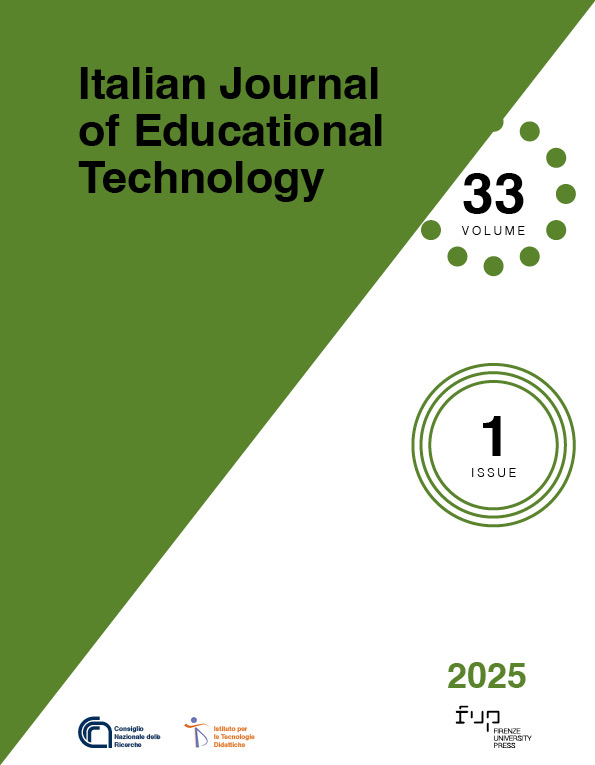Editorial. Board and video games in education: Challenges and opportunities
Main Article Content
Abstract
Game-Based Learning (GBL) continues to gain traction across educational levels, offering engaging, experiential approaches that foster both disciplinary learning and transversal competences. The articles featured in this special issue explore the educational potential of both commercial and serious games, digital and analog, to support learning in diverse domains, from STEM to media literacy. The issue also addresses key challenges in GBL implementation, including the need for learning design skills, teacher training, and inclusive practices that respond to learner diversity. Contributions adopt a variety of methodologies, from experimental studies to critical reviews, and extend the field’s scope by investigating underexplored topics such as biofeedback-based games and gender-related differences in gamification effectiveness. Taken together, the contributions emphasize the sheer variety of GBL approaches, while carefully considering how GBL should be employed to be effective.
Article Details
Section

This work is licensed under a Creative Commons Attribution 4.0 International License.
Authors who publish with this journal agree to the following terms:
- Authors retain copyright and grant the journal right of first publication with the work simultaneously licensed under a Creative Commons CC BY 4.0 Attribution 4.0 International License.
- Authors are able to enter into separate, additional contractual arrangements for the non-exclusive distribution of the journal's published version of the work (e.g., post it to an institutional repository or publish it in a book), with an acknowledgement of its initial publication in this journal.
- Authors are permitted and encouraged to post their work online (e.g., in institutional repositories or on their website) prior to and during the submission process, as it can lead to productive exchanges, as well as earlier and greater citation of published work (See The Effect of Open Access)
References
Andreoletti, M., Tinterri, A., & Dipace, A. (2024, October). Game at school? Italian teachers' perceptions of the introduction of games in the classroom. In K. Kilså & R. V. Basaiawmoit (Eds.), Proceedings of the 18th European Conference on Games Based Learning. Academic Conferences and Publishing Limited.
Arnab, S., Mahon, D., Masters, A., Morini, L., Minoi, J. L., & Mohamad, F. S. (2021, September). Towards the mapping of learning, playful, and frugal aspects for developing 21st century competencies and resilience. In P. Fotaris (Ed.), 15th European Conference on Games Based Learning (pp. 14–24). Academic Conferences and Publishing International. https://doi.org/10.34190/GBL.21.043
Arnab, S., & Walaszczyk, L. (2022). The potential of game-based micro-learning resources for engaging learners with intercultural competence development. Journal of Cognitive Sciences and Human Development, 8(2), 1–22. https://doi.org/10.33736/jcshd.4741.2022
Bermingham, S., Charlier, N., Dagnino, F., Duggan, J., Earp, J., Kristian, K., Luts, E., Whitton, N., & van der Stock, L. (2013). Approaches to collaborative game‐making for fostering 21st century skills. In Proceedings of the 7th European Conference on Games-Based Learning (ECGBL) (Vol. 1, pp. 45–52), Porto, Portugal, October 3–5. (ISI Proceedings).
Dagnino, F. M., Passarelli, M., Perrotta, C., & Persico, D. (2019). Editorial. Digital games and learning. Italian Journal of Educational Technology, 27(2), 87–90. https://doi.org/10.17471/2499-4324/1128
Deterding, S., Dixon, D., Khaled, R., & Nacke, L. (2011, September). From game design elements to gamefulness: Defining 'gamification'. In A. Lugmayr, H. Franssila, C. Safran, & I. Hammouda (Eds.), Proceedings of the 15th International Academic MindTrek Conference: Envisioning Future Media Environments (pp. 9–15). https://doi.org/10.1145/2181037.2181040
Hwang, G. J., & Chen, P. Y. (2022). Interweaving gaming and educational technologies: Clustering and forecasting the trends of game-based learning research by bibliometric and visual analysis. Entertainment Computing, 40, Article 100459. https://doi.org/10.1016/j.entcom.2021.100459
Passarelli, M., Dagnino, F. M., Earp, J., Manganello, F., Persico, D., Pozzi, F., Strano, A., Luciani, M., & Haggis-Burridge, M. (2019). Educational games as a motivational tool: Considerations on their potential and limitations. In H. Lame, S. Zvacek, & J. Uhomoibhi (Eds.), Proceedings of the 11th International Conference on Computer Supported Education (pp. 330–337). SciTePress. https://doi.org/10.5220/0007586503300337
Plass, J. L., Homer, B. D., & Kinzer, C. K. (2015). Foundations of game-based learning. Educational Psychologist, 50(4), 258–283. https://doi.org/10.1080/00461520.2015.1122533
Rye, S., Sousa, M., & Sousa, C. (2025). Introduction to game-based learning. In Transformative Learning Through Play: Analogue Games as Vehicles for Educational Innovation (pp. 29–68). Springer Nature Switzerland. https://doi.org/10.1007/978-3-031-78523-8_2
Silva, L. (2021). Through the screen: Reflections on online training experience about didactic and assessment use of boardgames. In Proceedings of the 2nd International Conference of the Journal Scuola Democratica, Volume II (pp. 63–76). Associazione “Per Scuola Democratica”.

